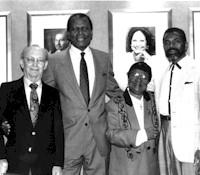
there are no rules about leaping into the new, because no one has ever been there before..
That was my high school yearbook quote, and remains something of a deep belief.
Guidelines are not the same as rules, though –and often, serendipity is a way of affirming direction.
Though separated by several years, two instances of particular chance are linked to the opportunities, and hopes, I have for the triptych.
The middle ‘panel’, called Breathing Ash, cuts close to the bone, touching issues of race, culture and politics.
In 2002, when the play was being seen at the end of an intense series of workshops, it had an especially powerful resonance, as some of the references to government surveillance and domestic military apparatus, were sensitive subjects to a present so immediately post 9/11 – the action of the play takes place in 2006, and is instigated by a Republican President down in his pole numbers, who sees the re-ratification of the Voting Rights Act as an opportunity to get the Senate to self destruct...
At the heart of the work is the story of a young black man who is caught in a series of disconnected suspicious incidents, judged without pity by the minister of his own community- and the life of a black junior congressman from New York, tasting his own unexpected power, not concerned of being low pawn on the political chess board in DC.
I’d written the play in 2000, and knew it to be politically hard hitting. But I also felt the interior terrain of Ash, looking at schisms in American black culture, was a fresh view of a potent issue, and was reminiscent of Lorraine Hansberry’s fresh view of such issues in A Raisin In The Sun.
One week before the presentation, as I walked through Borders Bookstore on M Street, NW, my glance caught sight of a hardcover book, stood upright in the middle of a small cafeteria table, as if its reader, finished with browsing, had forgotten to replace it on its shelf. The cover was facing me. I remember reading it and laughing outright as I walked over to the table to pick it up - the title being: You Can’t Do That On Broadway!
My chuckles melted to an awed silence as I read the book’s liner. This book was a memoir. And it was written by Philip Rose, the producer, against all kinds of odds, of Lorraine Hansberry’s play, A Raisin In The Sun.
I didn’t put it down; I bought it, and read it in an evening.
Lessons and incidents of overt racism, poured out across almost every page in the telling of bringing the play from a living room reading, to the stage. But what struck me most was the unshakable belief that Philip Rose had, in the rightness of the work, the unregistered talent of Lorraine Hansberry, and the need to have the play presented –and, most especially, the note throughout, never to let someone tell you ‘no’.
I was so moved and provoked by the passion of Philip Rose’s commitment, and the words of his expression of events in facing the bigotry, hardships of financing and closed mentality of the ‘dinosaurs at the gates’ of theatre, that meant to impede bringing this piece to the stage, that I found myself determined to meet this man, and closing the book at its last words, I dialed information and asked for the phone number of Philip Rose, at the address he (surprisingly) admitted to living at, in NY.
..in the memoir, he had also admitted to being fond of taking chances, and enjoyed those who walked through the open door of opportunity.. For some reason, I didn’t think twice at taking him at his word.
We spoke.
..I can’t say the words came out of my mouth with any sense to them, but he seemed to grasp that I had just read his book, and had been moved. We wound up speaking for twenty minutes. And then, he invited me to visit with him when I was next in New York. –..as serendipity would have it once more, I was in NY two days later, and took him up on the visit, taking him out for tea at a restaurant around the corner from his home.
[slideshow]
We spoke theatre; he went into other details of the journey with Raisin, as well as Purlie. He encouraged me to speak of my own writing, and I found myself finding words of frustration and anxiousness in describing my efforts with Breathing Ash, its challenging landscape of race and politics, as well as its ambitious visual narrative. He listened, nodded, understood, and I felt honest enough, with my uncertainties, to ask if he’d come see the presentation.
He did. Was engaged by it, and told me to keep pushing.
The second piece of serendipity connected to the triptych occurred in September of 2008..
